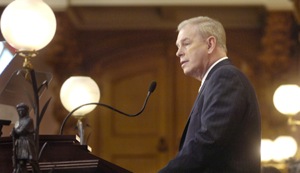-
- Largest Lutheran group affirms traditional marriage in draft statement on sexuality
- Ohio Lawmakers seek sexual orientation protections
- McGreevey confirms threesomes
- Oklahoma lawmaker receives death threats after anti-gay tirade
- Traveling exhibit at URI explores Nazi persecution of gays
- Vermont Supreme Court upholds ex-partner’s visitation rights
- National News Briefs
- World News Briefs
national
Ohio Lawmakers seek sexual orientation protections
Advocates argue discrimination effects economy
Published Thursday, 20-Mar-2008 in issue 1056
COLUMBUS, Ohio (AP) – After Jimmie Beall was fired from a teaching job she loved because she was a lesbian, she made a promise to her students that she’d fight to prevent the same thing from happening to others.
On March 11, Beall helped state lawmakers unveil a bill that would prohibit discrimination based on sexual orientation in jobs, credit and housing. Backers say the political climate is prime to make Ohio the 22nd state to pass such a law.
Opponents of similar measures that have failed in the past suggest the potentially divisive proposal’s introduction may be politically loaded, coming just months before a critical presidential contest in the pivotal swing state.
Beall said she had just received a stellar review and great new work assignment days before her firing from the London City Schools in western Ohio. Then the principal discovered she was gay.
“Being fired left me stunned, absolutely devastated,” she said. “I don’t know how to express how it feels when you know that you have children and no income and no insurance now because of who you are.”
Democrats – led this year by Rep. Dan Stewart of Columbus in the House and Sen. Dale Miller of Cleveland in the Senate – have been behind similar measures in the past. More unique are the two Republicans who have signed onto the proposal this time: so far, Rep. Jon Peterson of Delaware and Sen. David Goodman of Bexley.
Peterson, who backed a bill in 2004 declaring same-sex marriage in conflict with state policy, said he has been soul-searching since then on the question of gay rights.
After conversations with his pastor, friends, and his 14-year-old daughter – who is nonplussed at anyone’s interest in someone else’s sexual preferences – he decided to advocate the anti-discrimination legislation.
“It’s a new day, it’s a new time,” he said. “And I am focused on trying to open hearts, and open their eyes and their ears to compelling testimony like Jimmie’s this morning.”
Gov. Ted Strickland, a Democrat, said last Tuesday that he would sign the bill if it made it to his desk.
Lynne Bowman, executive director of the GLBT rights group Equality Ohio, said 21 other states, 433 of the Fortune 500 companies, 11 of the state’s 13 four-year universities, and 16 Ohio cities and villages already have such protections in place.
“The public supports this, our top business leaders embrace this, fairness demands this,” Bowman said. “Why would the state tolerate any form of discrimination for any reason?”
Barry Sheets, a lobbyist for the conservative Christian group Citizens for Community Values, said similar bills have failed to win support in the past – and that workplace equality seems to be improving for gays and lesbians just the same.
“I’m wondering if this isn’t a solution in search of a problem,” he said. “If I’m not mistaken, the Human Rights Campaign just came out with a workplace equality index and said there’s been quite a massive increase in the number of businesses that are GLBT-friendly.”
He wondered why a bill with few changes from its earlier incarnations took until 15 months into a 24-month session to be introduced.
Sheets’ organization backed a statewide same-sex marriage ban in 2004 attributed with mobilizing Christian conservatives who helped swing the state to President Bush in that year’s election.
The bill’s advocates say they have a growing body of evidence on discrimination’s economic effects – such as Beall’s loss of her job and insurance – to make their case this time around.
A 2002 study by the U.S. General Accounting Office found that such protections did not lead to a flood of lawsuits against government. In California, 596 of the 17,668 discrimination cases filed in 2001, for example, involved sexual orientation. In Connecticut, the number was 44 of 2,006. In the District of Columbia it was 19 in 210, and in Hawaii, 9 of 535, the study found.
And a recent survey by The United Way found that half of the gay, lesbian, bisexual and transgender people who responded had been victims of some form of discrimination.
Beall said the superintendent in her former school district sent an e-mail to school board members urging them to fire her, just based on the suggestion that she might be gay. He later told the courts he didn’t know it was wrong to discriminate based on sexual orientation. The district has since passed an anti-discrimination policy.
|
|
Copyright © 2003-2025 Uptown Publications


